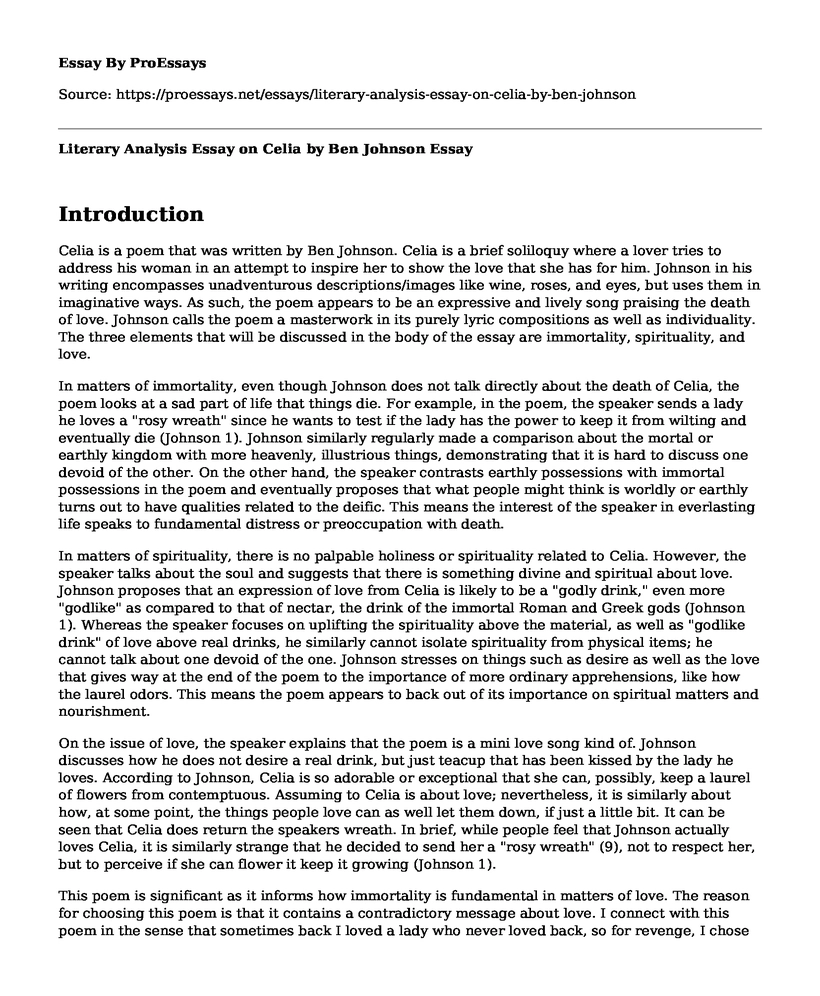Introduction
Celia is a poem that was written by Ben Johnson. Celia is a brief soliloquy where a lover tries to address his woman in an attempt to inspire her to show the love that she has for him. Johnson in his writing encompasses unadventurous descriptions/images like wine, roses, and eyes, but uses them in imaginative ways. As such, the poem appears to be an expressive and lively song praising the death of love. Johnson calls the poem a masterwork in its purely lyric compositions as well as individuality. The three elements that will be discussed in the body of the essay are immortality, spirituality, and love.
In matters of immortality, even though Johnson does not talk directly about the death of Celia, the poem looks at a sad part of life that things die. For example, in the poem, the speaker sends a lady he loves a "rosy wreath" since he wants to test if the lady has the power to keep it from wilting and eventually die (Johnson 1). Johnson similarly regularly made a comparison about the mortal or earthly kingdom with more heavenly, illustrious things, demonstrating that it is hard to discuss one devoid of the other. On the other hand, the speaker contrasts earthly possessions with immortal possessions in the poem and eventually proposes that what people might think is worldly or earthly turns out to have qualities related to the deific. This means the interest of the speaker in everlasting life speaks to fundamental distress or preoccupation with death.
In matters of spirituality, there is no palpable holiness or spirituality related to Celia. However, the speaker talks about the soul and suggests that there is something divine and spiritual about love. Johnson proposes that an expression of love from Celia is likely to be a "godly drink," even more "godlike" as compared to that of nectar, the drink of the immortal Roman and Greek gods (Johnson 1). Whereas the speaker focuses on uplifting the spirituality above the material, as well as "godlike drink" of love above real drinks, he similarly cannot isolate spirituality from physical items; he cannot talk about one devoid of the one. Johnson stresses on things such as desire as well as the love that gives way at the end of the poem to the importance of more ordinary apprehensions, like how the laurel odors. This means the poem appears to back out of its importance on spiritual matters and nourishment.
On the issue of love, the speaker explains that the poem is a mini love song kind of. Johnson discusses how he does not desire a real drink, but just teacup that has been kissed by the lady he loves. According to Johnson, Celia is so adorable or exceptional that she can, possibly, keep a laurel of flowers from contemptuous. Assuming to Celia is about love; nevertheless, it is similarly about how, at some point, the things people love can as well let them down, if just a little bit. It can be seen that Celia does return the speakers wreath. In brief, while people feel that Johnson actually loves Celia, it is similarly strange that he decided to send her a "rosy wreath" (9), not to respect her, but to perceive if she can flower it keep it growing (Johnson 1).
This poem is significant as it informs how immortality is fundamental in matters of love. The reason for choosing this poem is that it contains a contradictory message about love. I connect with this poem in the sense that sometimes back I loved a lady who never loved back, so for revenge, I chose to blackmail her before she realized my real intention. This poem has taught me that sometimes, the things people love can as well let them down. What I will remember from this poem is that if love is not reciprocated, it goes sour.
Works Cited
Johnson, Ben. "Song: to Celia ["Drink to me only with thine eyes"]." 2019. <https://www.poetryfoundation.org/poems/44464/song-to-celia-drink-to-me-only-with-thine-eyes>.
Cite this page
Literary Analysis Essay on Celia by Ben Johnson. (2022, Nov 29). Retrieved from https://proessays.net/essays/literary-analysis-essay-on-celia-by-ben-johnson
If you are the original author of this essay and no longer wish to have it published on the ProEssays website, please click below to request its removal:
- Critical Essay Sample on Death of a Salesman
- An Unweeded Garden: The Use of Floral Symbolism in Shakespeare's Hamlet
- Walt Whitman's Influence on Allen Ginsberg and William Carlos Williams Essay
- Hamlet by Shakespeare: Literary Essay Analysis
- The Theme of Family and Class in "The Bluest Eye" and "The Great Gatsby": Compare and Contrast Essay
- Essay Example on The Marrow Thieves and Its Depiction of Indigenous Resilience
- Essay Sample on A Clean, Well-Lighted Place: Hemingway's Autobiographical Criticism







